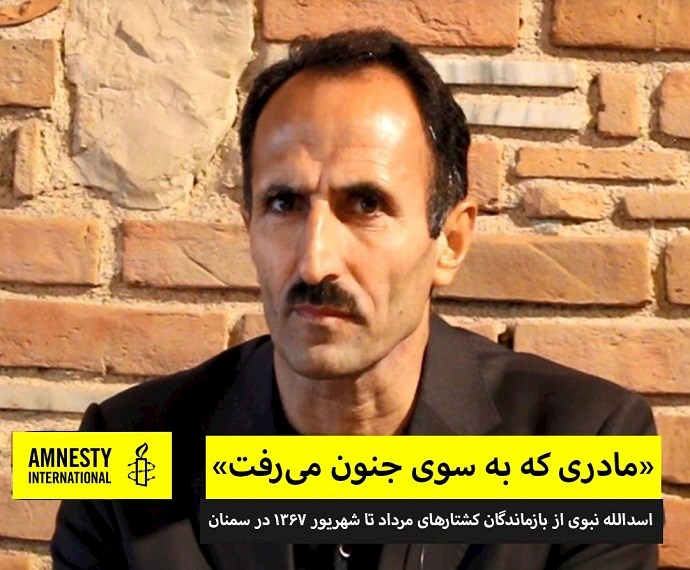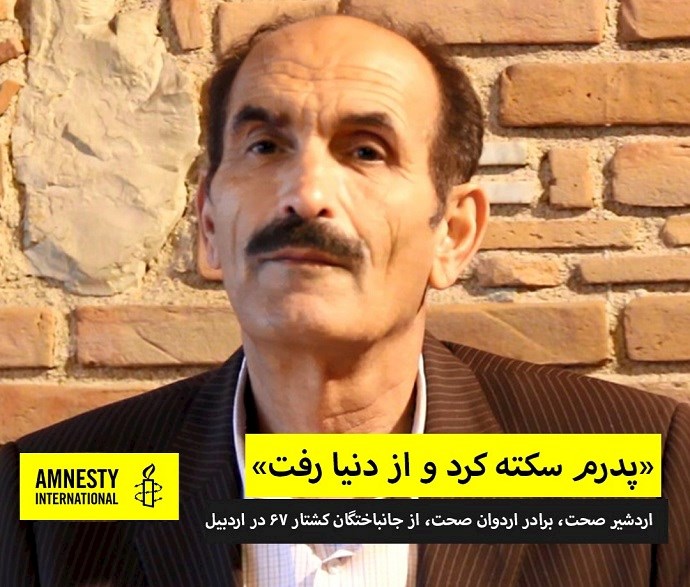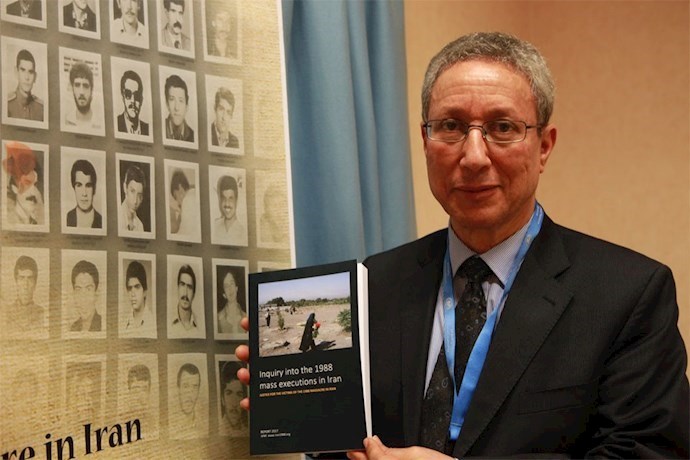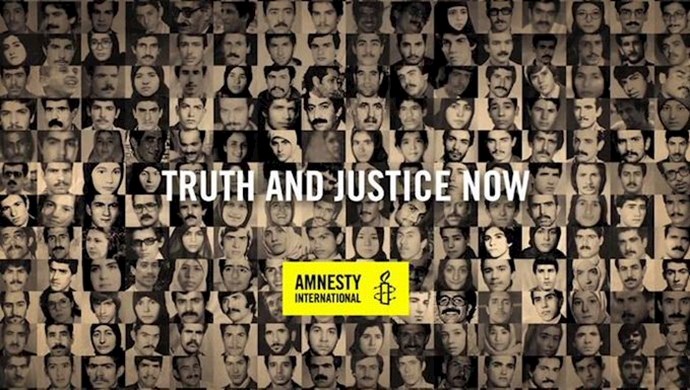Reporting by PMOI/MEK
Iran, August 14, 2020—In the summer of 1988, the clerical regime ruling in Iran secretly executed several thousands of political prisoners. Three decades on, families and survivors are still seeking justice.
In a series of tweets, Amnesty International shared excerpts from interviews with witnesses and survivors of the horrible crime that has become known as the “1988 massacre.”
In 1988, the Iranian authorities forcibly disappeared and secretly executed several thousand political dissidents.
Three decades on, families and survivors are still seeking #truthandjustice.
We stand with them.https://t.co/dJhMJLRUWY pic.twitter.com/RKZG3SRRvI
— Amnesty Iran (@AmnestyIran) August 12, 2020
Thirty-two years after this crime against humanity, many families of the victims are still unaware about the fate and burial place of their loved ones. The 1988 massacre of political prisoners, mostly members, supporters and sympathizers of the Iranian opposition group, the People’s Mojahedin Organization of Iran (PMOI/MEK) was an unprecedented crime against humanity that that continues to this day.
In August of the same year, shortly before the carnage began, prison authorities across Iran stopped family visits for thousands of political prisoners without offering any explanation. Doctors, nurses, engineers, teachers, academics, students, and workers were among these prisoners. Some of them were high school or college students at the time of their arrest.
Most of the MEK supporters, were imprisoned for their political beliefs and peaceful activities, such as distributing newspapers and pamphlets, participating in demonstrations, and raising funds for the families of political prisoners.
Many prisoners were arbitrarily detained without being trialed or convicted at all. Some of them had already been given their sentence, from life imprisonment to shorter periods of two to three years. Some prisoners had served their sentences and were supposed to be released soon but were told that they would continue to be held in prison because they had not repented their support for MEK.
The concerned families repeatedly visited prisons, the judiciary, and other government agencies without getting accurate information.
Some families brought clothes, food, medicine, and money with the hope that to receive a signed receipt from their imprisoned relatives to have received these items, thus ensuring that they are alive. Prison officials often accepted these items without mentioning whether the prisoner was alive or not. In some places, officials falsely told victims’ families that their relatives had been transferred to prisons in other provinces, and the families had to make long and fruitless trips.
Witnesses and survivors’ testimonies
In a 327 pages report, Amnesty International interviewed many survivors and witnesses of the 1988 massacre who currently live in Ashraf 3, the MEK camp in Albania.
Assadollah Nabavi, one the survivors of the 1988 massacre who at the time was in the prison of Semnan, told Amnesty that at that time the suspension of visits of prisoners had left many families suffering from psychological breakdowns. In mid-August, Nabavi was transferred to solitary confinement until December and had no contact with the outside world.
Later he was transferred to the Notorious Evin prison. “In autumn 1988, my father had a heart attack because he didn’t have any news from me,” he recounted. “The authorities of Semnan judiciary told my father that they have no news and that he has to ask the authorities in Evin prison.”

Assadollah Assadi, one of the survivors of the 1988 massacre in Iran, lives today in Ashraf 3, the MEK camp in Albania.
“The mother of Mohammad Reza Ahmadi regularly brought carrots to the prison because he had told his mom that his eyes have become very weak in prison. Until two years after the massacre Mohammadreza’s mother continued to bring bags of carrots to the Semnan prison. She made a very long trip every time from Rikan village close to Garmsar to deliver the bag of carrots to his son. She didn’t know he was executed,” Assadollah said.
“Time after time, the prison authorities told Mohammad Reza’s mother that they have no news and she must go, and they will tell her later about the destiny of her son. This old mother was in an almost critical mental state,” Assadollah sadly explained to Amnesty.
Former political prisoner Ardeshir Sehat was locked away the beginning of August 1988 in Ardabil’s Ghahghara Prison and his family were searching for him. His brother Ardavan was serving his sentence for being supporter of the MEK. Ardeshir tells Amnesty International: “For months the prison authorities lied to my family. They told them that my brother was sent to Tabriz prison but then they said he was transferred to Evin prison in Tehran. They deliberately left my family searching. As a result, my father had a stroke and died in the winter of 1988.”

Ardeshir Sehat, former political prisoner and one of the survivors of the 1988 massacre in Iran, lives today in Ashraf 3, the MEK camp in Albania.
“After a year of search, my mother finally finds out that my brother was buried in a mass grave, one kilometer away from our home in Ali Abad cemetery,” Ardeshir explains.
Mehdi Abdolrahimi, another survivor of the 1988 executions of Iranian political prisoners said to have met with Ardavan Sehat’s family after his release in the winter of 1988. He told Amnesty International that the regime’s authorities had arrested Sehat’s mother for days to force her to let go of the case of her son. According to Mehdi Abdolrahimi the mother of Ardavan Sehat was unaware of the destiny of her son until March 1989.
Legal steps to bring perpetrators to justice
The MEK has long called for an international investigation into this crime against humanity. According to information obtained by the MEK, more than 30,000 political prisoners were executed during the 1988 massacre. Many of the authorities involved in the executions continue to enjoy impunity and hold positions of power in the regime.
In the Free Iran Global Summit, Tahar Boumedra, former head of the UN Advisory Mission for Iraq’s Human Rights Office and a member of the advisory board of the nonprofit Justice for Victims of 1988 Massacre in Iran (JVMI), said: “In 2018, the former human rights commissioner Zeid Hussein said the UN has informed the regime to investigate the crime. Two years later, the Special Rapporteur on Human Rights in Iran is asking the same thing. We know the mullahs’ regime will not investigate. It is naïve to believe the mullahs would investigate themselves. Let’s warn the UN that enough is enough. The regime will not investigate its own crimes and impunity has emboldened the Iranian authorities. They continue to commit crimes. It is time to think about a coalition of civil society and NGOs to lobby all together and make sure we find a way to take this crime to national courts across the world who accept universal jurisdiction.”

Tahar Boumedra, a former UN official and the lead author of the 360-page report Inquiry into the 1988 mass executions in Iran.
Boumedra also warned in an article recently published in Town Hall that the U.N. failed to stop the massacre despite being given credible information that a massacre was taking place secretly in Iran’s prisons and still failed to act when human rights groups and Amnesty International documented the genocide.
“Even when a 1988 audio tape of members of the “Death Commissions” and top officials discussing the massacre surfaced in 2016, the UN still refused to hold Iranian officials accountable,” he wrote and emphasized that silence of the U.N. has only bred impunity for those Death Commission members whose voice could be heard on the tape, such as Ebrahim Raisi, who is Iran’s Judiciary Chief today.
“With the UN unable, or unwilling, to take any sort of meaningful action, the responsibility falls on Western democracies to demand justice and to ensure the world won’t witness yet another crime against humanity by the perpetrators of the 1988 massacre who remain in power,” Boumedra writes. Testament to the fact is the continued crimes of the regime against the people, including the brutal killing of 1,500 protesters in the nationwide uprisings of November 2019 and the continued execution of political prisoners.
Boumedra emphasized that crimes against humanity are not bound by the statute of limitations, and even though the crime itself was perpetrated 32 years ago, it is still prosecutable today and enlightened that the Iranian officials brazenly claim Khomeini’s fatwa still stands against the MEK dissidents who seek to topple the regime.
“The mass murderers responsible for the atrocity today run the Iranian government and judiciary. The survivors are still alive, and the evidence is all readily available. It is not a moment too soon for one democratic government to step up and file a request at the ICC for criminal proceedings to begin against Iran’s mass murderers,” he concluded.





